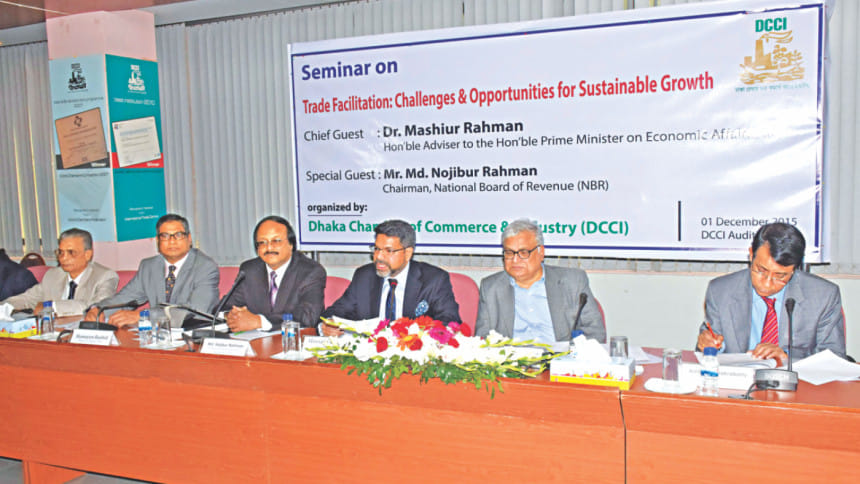Reforms needed to fast track trade facilitation: analysts

Reforms are needed to fast track the introduction of trade facilitation measures, as Bangladesh lags behind others in implementing global rules, Mashiur Rahman, economic affairs adviser to the prime minister, said yesterday.
“The trade facilitation committee should also be trade friendly, instead of focusing on revenue,” he said.
He spoke at a seminar on “trade facilitation: challenges and opportunities for sustainable growth” at the office of Dhaka Chamber of Commerce and Industry.
Trade facilitation has to be done through an effective economic analysis so that it removes distortions, Rahman said.
“It will ultimately help entrepreneurs. Once their business starts operating smoothly, their costs will go down and they will be able to explore untapped markets.”
The government will have to remove the obstacles that stand in the way of trade, he said, adding that harmonisation of duties and taxes and simplification of procedures are also crucial to attracting foreign investors.
“If they have to pay taxes in their home countries as well as in Bangladesh, their aggregate tax will be higher. As a result, they will not come here, and go to other countries instead, where corporate taxes are low.”
Rahman also agreed with suggestions made by a number of speakers at the seminar that the trade facilitation committee should be enlarged, taking think-tanks and chambers in board.
Khairuzzaman Mozumder, deputy chief of USAID, said trade facilitation is viewed as the most effective means of overcoming slow and archaic customs clearance systems, cumbersome documentation requirements and inadequate transport infrastructure.
There are 38 trade facilitation measures as per the World Trade Organisation's ninth ministerial meeting in Indonesia in 2013.
Some 52 countries, including a number of least developed countries, have already ratified the WTO agreement on trade facilitation. The agreement will come into effect, if 108 countries ratify it.
In a presentation, Mozumder said Bangladesh has fully complied with three measures -- pre-shipment inspection; separation of release from final determination of duties/taxes/fees; and national committee on trade facilitation. “In many measures, only legislative changes will lead to full compliance,” he said, adding that if parliament ratifies the Customs Act, five to six measures will be complied with.
Despite modernisation and automation, the time taken for customs clearance is still beyond acceptable limits for businesses, said Mozumder.
At Chittagong Port, the average time from arrival of vessels to release of imported goods is 11 days 9 hours and 45 minutes, while for exported goods, it takes four days 22 hours 38 minutes, he said, quoting a study.
In absence of an elaborate policy, a detailed procedural guideline and a strategic management plan on risk management, the customs department tends to examine a large number of consignments, he said. The problem is more acute in land ports, where 100 percent consignments are subject to some form of physical inspection, he added.
Trade processes are cumbersome and time-consuming, adding costs to traders.
The trade cost per container for import is $1,515 and for export is $1,281, according to the World Bank's Doing Business Report of 2015.
Md Nojibur Rahman, chairman of the National Board of Revenue, said trade facilitation is a priority for them. "We will provide all kinds of cooperation to businesses."
Import clearance time at Chittagong Port has come down to 8.5 hours from 11 hours; there have been improvements in other areas as well, he said.
DCCI President Hossain Khaled said implementation of the trade facilitation agreement is expected to benefit Bangladesh by lowering the cost of doing business by 16.5 percent and lead time by 10 percent.
It is also expected to increase cross border trade by 15 percent and earn an additional $4 billion in annual export earnings, raise employment by 5 percent and accelerate GDP growth to 8 percent by 2021, he added.
Amitava Chakraborty, director general of the WTO cell at the commerce ministry, said the government will have to notify the WTO about the measures it will undertake within one year of the agreement, the measures it will implement on its own and the ones it will not be able to put into action on its own.
The World Bank, Asian Development Bank and International Finance Corporation are ready to provide assistance to implement trade facilitation measures, said Khondaker Golam Moazzem, additional research director of the Centre for Policy Dialogue. An action plan has to be formulated to this effect, he added.
“The benefits of trade facilitation measures far outpace the demerits.”
A high-level committee should be formed to oversee the implementation of the trade facilitation measures, he added.
Mohammad Hatem, former first vice president of Bangladesh Knitwear Manufacturers and Exporters Association, requested the government to empower the customs department, so it can conduct pre-shipment inspection if any trader makes a mistake in the procedure.
DCCI Senior Vice President Humayun Rashid also spoke.

 For all latest news, follow The Daily Star's Google News channel.
For all latest news, follow The Daily Star's Google News channel. 



Comments